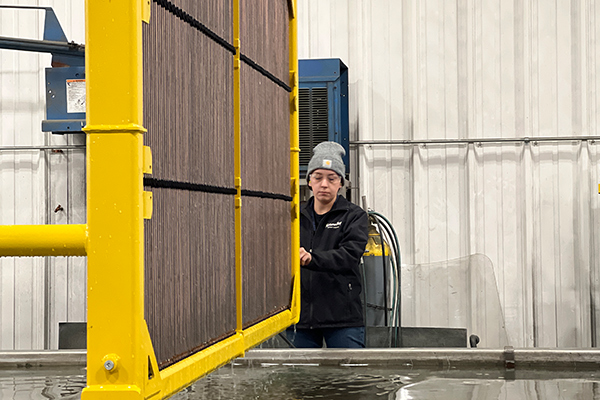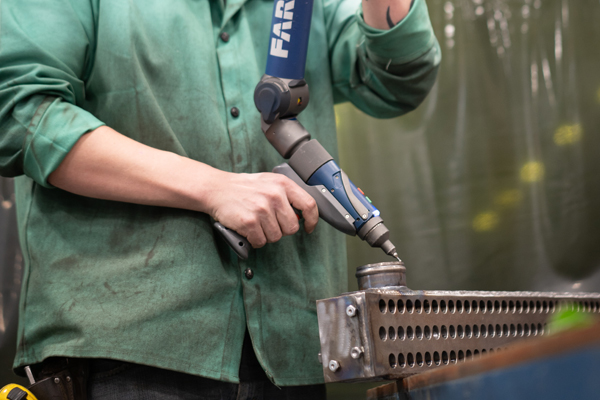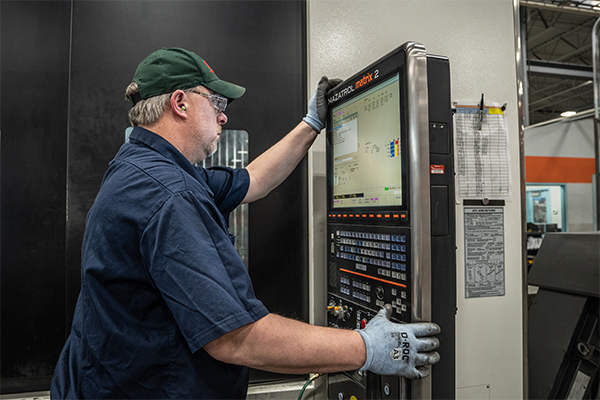What’s the secret sauce behind L&M Radiator’s legendary heat exchangers that are sought by mining and oil and gas operations across the globe?
For the company’s head of quality assurance, it’s a combination of ingenuity, flexibility and most of all, quality.

“The confidence we have in our products is built on quality, and quality is everyone’s business here at L&M Radiator,” said Randy Tupa, L&M Radiator Quality Assurance Manager. Tupa oversees the ISO quality management system, training, and CMM programming at L&M Radiator Inc.’s locations in Hibbing, Minnesota; Yankton, South Dakota; and internationally in Chile. Tupa also communicates and shares relevant information regarding quality standards with L&M Radiator’s plants in Mexico and Australia.
“Our quality program is top-down and bottom-up with involvement from our senior management team to the newest employee on the production floor. Everyone is involved in our quality management,” Tupa said.
Customers decide to purchase for three reasons: price, delivery, and quality. For L&M Radiator, quality is non-negotiable. A high-quality genuine Mesabi® radiator not only enhances performance and durability in the machines in which they are used but saves money in the long run because it is designed to last the life of the equipment that it is installed in.
“We always deliver on quality. When it comes to price, our prices can be higher than our competition, but a customer’s upfront investment is rewarded when they see our Mesabi® products are built to last and can perform in any condition,” Tupa said. “Quality at L&M means making sure our Mesabi® heat exchangers get to the customer right the first time and there are no issues with fit or performance.”
L&M Exhibits Quality Assurance and Quality Control
Throughout his 23-year-career with L&M Radiator, Tupa’s role as Quality Assurance Manager has evolved from his start on the company’s shop floor.
“I went from the shop floor to Quality Control as a QC Inspector, and eventually I transitioned into the Training Coordinator position for L&M,” said Tupa. “That’s when the company took a huge step in quality assurance that went beyond the machinery and safety practices – it starts the first day on the job for a new employee, teaching and training them how to produce Mesabi® products with a quality mindset.”
Through Tupa’s leadership, the company began a rigorous training program for new L&M Radiator employees that teaches them more than just how to build the product but showcases the value of the product – how it works, how it’s used in the field and what conditions it may encounter.
“There are many moving parts and departments within L&M. Understanding the importance of putting something together correctly the first time is essential to our manufacturing process,” Tupa said.
The training program at L&M doesn’t wrap up in just a few days. Instead, training in new employees spans six months or longer, which includes monitored education and preparation.
“We get people making quality product right out of the gate. Between supervisors, team leaders, mentors, and peers – everyone is engaged in the teaching process,” Tupa said. “Our warranty costs at the end of fiscal year 2023 were 0.10%, which tells us that we’re getting our product to the customer correct the first time, over 99% of the time.”
Quality Checks Every Step of the Way

One part of the old quality control process at L&M Radiator involved the use of quality control inspectors who checked everything from incoming suppliers product to product as it went through different stages in the manufacturing process. Whereas the practice of our current quality assurance program involves building the quality into every step of the process.
“What separates L&M’s expectation for quality is we’re not waiting until final assembly to inspect the product and find issues. We are inspecting it at every step in the process,” Tupa said.
The company also incorporated a CMM or FaroArm which helps L&M proof and prove its building processes and fixturing. For example, mechanical engineering designs are now tabbed and slotted. Machines and inspectors can check that process every time with the FaroArm to ensure conformity.
“The best part about introducing a quality check through some of our machining is that if our parts are consistently passing the quality check, it is no longer necessary to inspect every piece. We have gotten so consistent that we now must only inspect approximately every 30 pieces,” Tupa said. “This saves us about 47% of time on an inspection of the products we have programmed – which I consider to be an incredible amount. That means more production time.”
Setting the Standard for Quality Internationally
L&M Radiator’s quality management system is set up so that all plants — regardless of location — can follow the same quality guidelines to manufacture the same product.
“Our Australia, Minnesota and Mexico plants are certified to ISO 9001:2015 standards,” Tupa said. “Our plants in Yankton and Chile are set up to run the same exact way we do in Hibbing. They follow the same tubing, steel prep, machining, welding, assembly, and shipping processes.”This ensures no matter where a customer purchases an L&M product it is built to meet the exact same high standards of quality. The quality management system also allows for customers to audit the process to ensure the product they’re receiving is the quality they expect.
Tupa added that regardless of what is being manufactured, the guidelines don’t change.
“Quality is quality. Whether we’re making a four-by-four-foot radiator or 12-by-12-foot radiator, it goes through our process the same way,” Tupa said. “We have the same checks and balances. We have prints we have to follow. We calibrate specific tools for that job as well as building procedures and work instructions if the piece is unique to a client.”
Quality is an Evolution
L&M Radiator continues to modify its quality processes to ensure an even higher standard of quality. One of the greatest changes to quality processes L&M Radiator has made in recent years was changing the company mindset from individualized work to a team experience.
“About 20 years ago everyone at their station had their own sets of tools and it was this ‘my toolbox’ mindset,” Tupa said. “Now everyone across all departments has access to all the tools at or close to their work stations and people focus on building the product right the first time, rather than searching for tools or materials. They regularly resource each other for questions or guidance instead of working individually and having an inspector over their shoulder to critique the standard of work.”
In the last 10 years, Tupa said the company began summarizing its written instructional content for employees to reference, though the company still relies heavily on its own community to pass down expertise.
“We don’t want people carrying around novels,” Tupa said. “Some of our processes are summarized in four pages and we rely on our most experienced employees to pass down their knowledge of engineering, design and process to train in new hires.”

The Best Improvement to a Quality Management System is Subtraction
Tupa’s role isn’t always black and white, where he finds a problem and a solution. Rather, quality management is his constant evaluation of all work processes to make them more efficient, more accurate, and using fewer materials.
“When we isolate an issue, we do root cause analysis. We dive into it, and we find a permanent corrective action to fix it,” Tupa said. “We don’t want to keep adding inspection points or adding work for people on the shop floor.”
Tupa’s mindset is to learn from any issues that arise whether it’s man, machine, or process and ensure it won’t happen again.
L&M Radiator continues to support quality management by investing in 5S, a methodology for creating more organized and productive workspaces through the five pillars: sort, straighten, shine, standardized and sustain. 5S serves as a foundation for deploying more advanced lean production tools and processes.
The company and Tupa also work to quantify processes to record quality progress. In the quality department they review warranty costs and review rework hours for products.
“We follow a monthly quality assurance report across all plants,” Tupa said. “This not only holds us accountable to our goals, but we also can parse out what the issue was and where in the process things went wrong.”
As for customer relationships, Tupa said L&M has an outside registrar conduct three surveillance audits over a three-year period that check compliance to all of our quality management system standards and processes.
“In my opinion we go above ISO standards. While that costs us a little more, it keeps our customers happy and they trust our products and service,” Tupa said.
Warranties Reflect Standard of Quality
Mesabi® products have a history of outlasting one, two, even three engine lifespans on some of the equipment its placed on.
“We are really proud of our warranties because we know our products are built to last,” Tupa said. “The warranty for seal leakage, for example, is 48 months, and we’ve done our testing and our diligence with our seal design to ensure that product is good.”
Tupa added L&M specifies to customers the importance of cleaning the Mesabi® products during maintenance, but the company engineering team has tested and designed L&M products to outlast bugs, mining dust and other debris that may arise in some of the harshest conditions.
About Randy Tupa
Tupa was born and raised in Hibbing, Minnesota. He joined the Marine Corps in 1980 and spent 15 years in the service. Read more about Tupa here.
Advice for Those Considering a Career at L&M
“Bring a positive attitude and show them what you can do,” Tupa said. “The mentorship I have experienced at L&M has helped me succeed and build my career.”
To explore careers with L&M Radiator, visit the Careers page on Mesabi.com.


